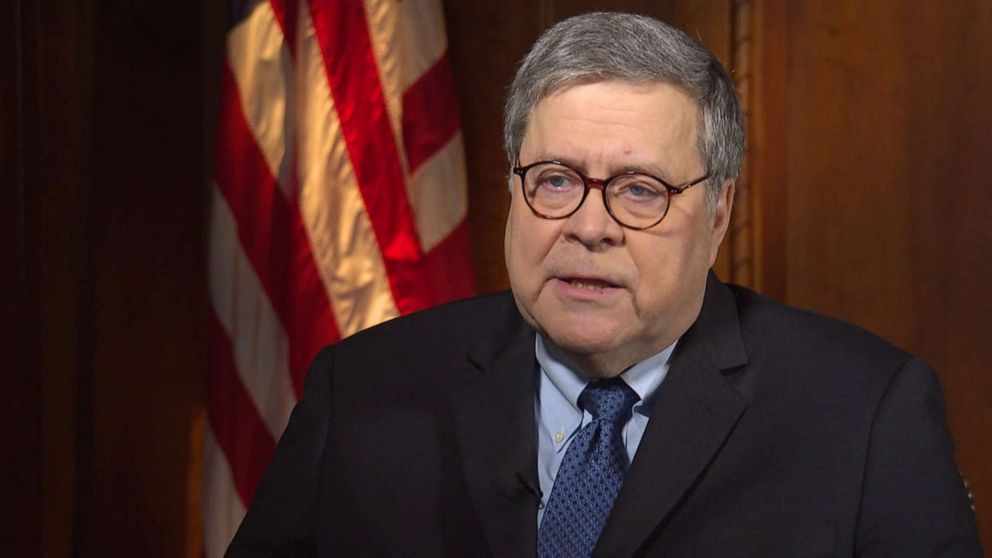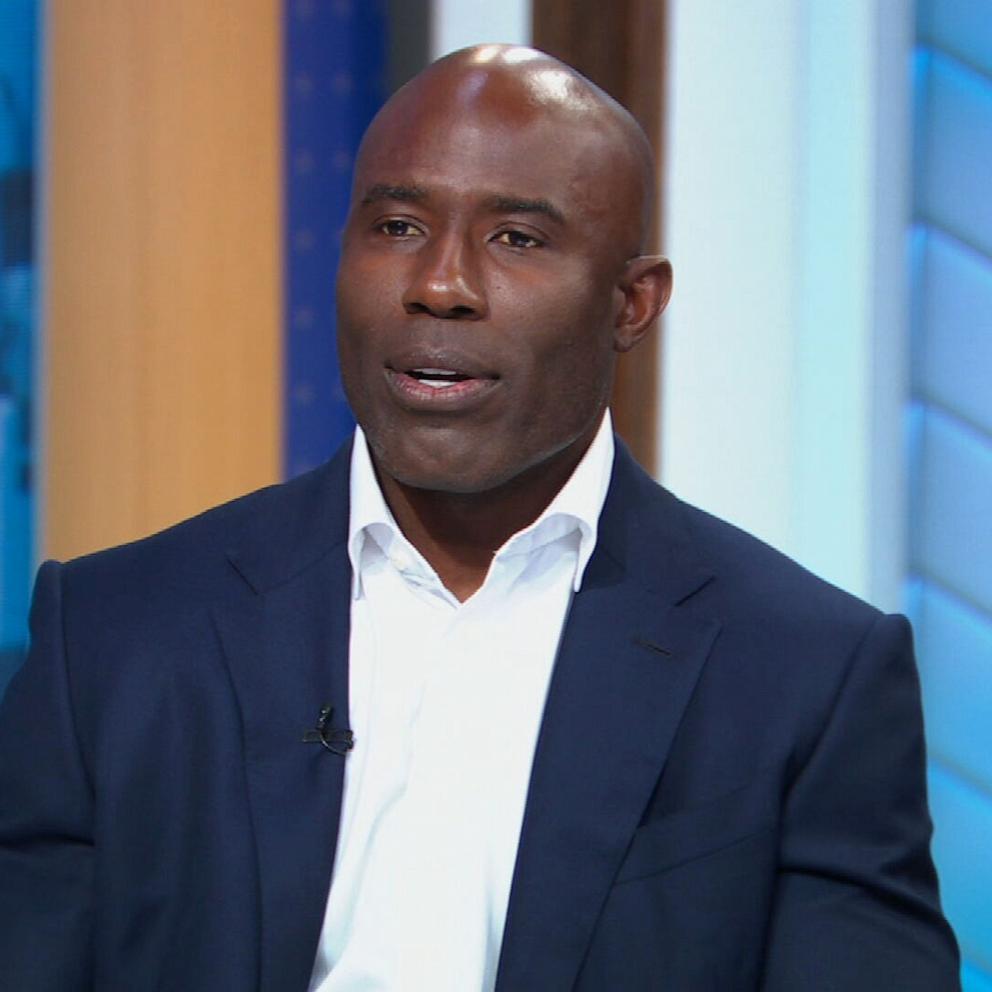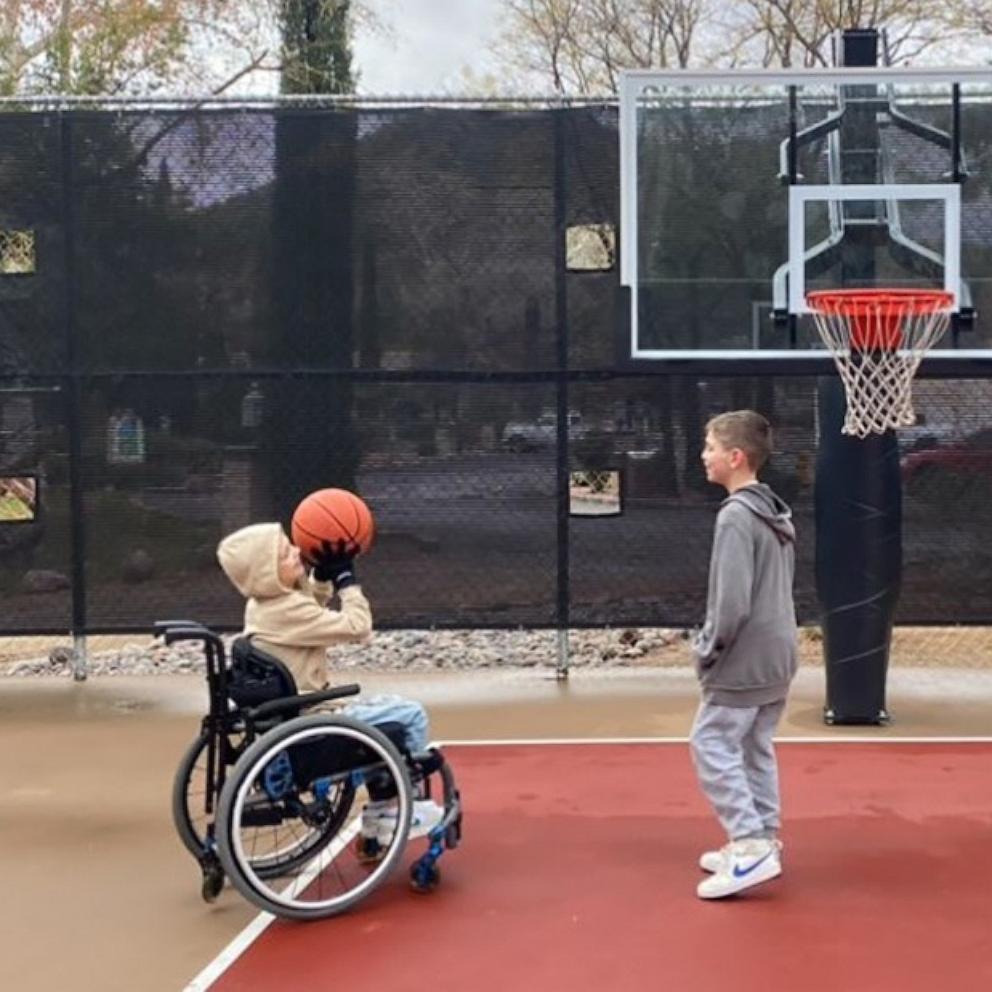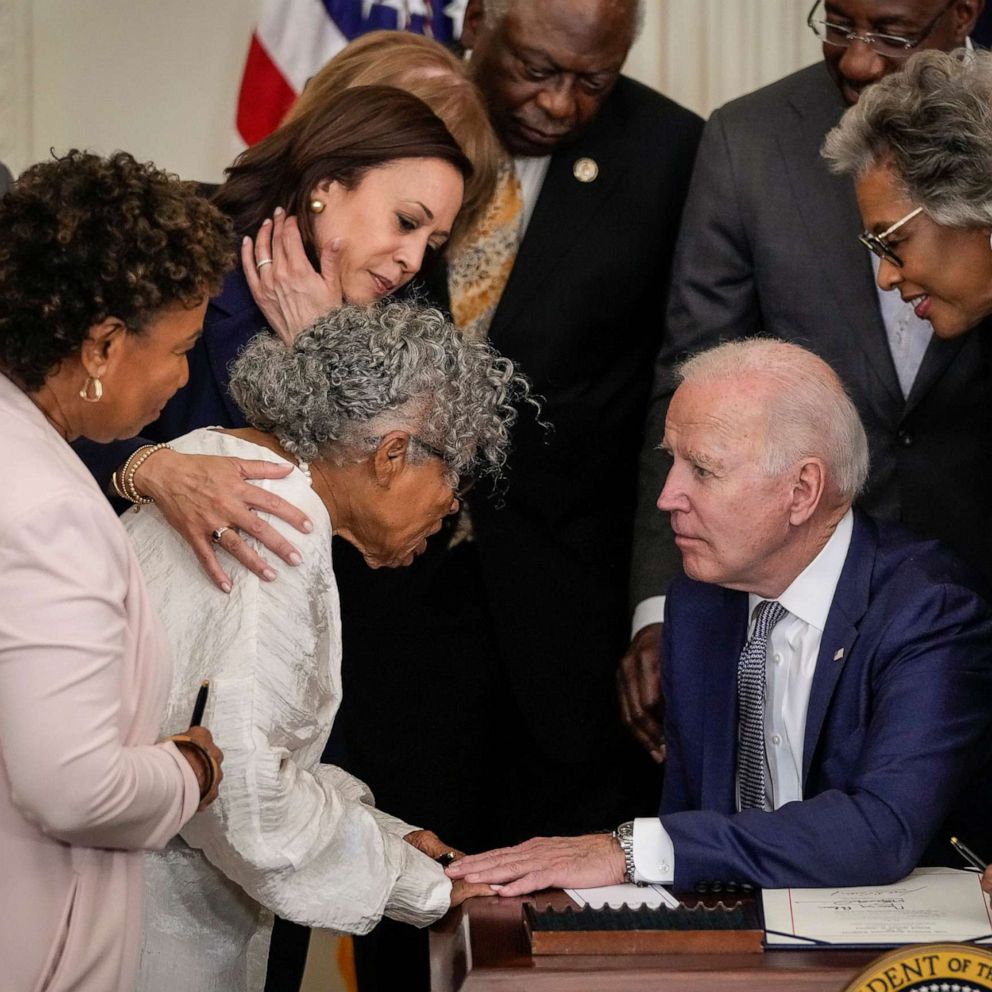Transcript of Attorney General Bill Barr's exclusive interview with ABC News
This is a transcript.
ABC NEWS CHIEF JUSTICE CORRESPONDENT PIERRE THOMAS: General Barr, thank you for your time.
ATTORNEY GENERAL BILL BARR: Thank you.
THOMAS: This is the first time we're hearing from you since the Roger Stone story erupted. At minimum, there appears to be an appearance problem. Trial prosecutors recommended 7 to 9 years on Monday evening. The president tweets at 1:48 AM Tuesday morning calling the recommendations - quote “horrible, unfair and a miscarriage of justice.”
Then word comes out from DOJ headquarters Tuesday morning that the recommendations are too severe and suggests a lesser sentence is more appropriate. Four of the trial attorneys resigned from the case. One of them quitting the Justice Department altogether.
What happened, sir, and what was your role?
BARR: Well, as you know, the Stone case was prosecuted while I was attorney general. And I supported it. I think it was established, he was convicted of obstructing Congress and witness tampering. And I thought that was a righteous prosecution. And I was happy that he was convicted.
The issue then became the sentencing. A new U.S. attorney had just started in Washington D.C. and the week before the filing, he engaged in conversations with senior staff here who raised some questions about the sentencing because he was concerned that the so called guidelines, the sentencing guideline formula, was indicating a sentence between 7 and 9 years.
Which, he felt and all of us immediately felt was very, very high and excessive in this case. And so he wanted to discuss that and over a number of days it became clear that the prosecution team wanted to recommend to the judge, and by the way, sentencing is a function for the judge and not the Department of Justice, we're not the decision maker. But they wanted to advocate for a sentence that was, at the top, between 7 and 9 years.
And, in those discussions here at the department, you know, I came to the view as my colleagues did that I wouldn't support affirmatively advocating what I thought was an excessive sentence.
So, what I wanted to do what to provide dis -- defer to the discretion of the judge, let the judge make the determination.
THOMAS: You wanted to do that from the outset?
BARR: Yes. And then point out different features of the case that she should consider if she wanted to go below the 7 to 9 years. And I won't get into the wires on that, but there were a lot of, I think, very legitimate arguments to be raised, there are points to be raised there. But at the end of the day, we deferred to her. Or, and that was what the approach was, I thought, we were going to take.
THOMAS: So the US attorney for the District of Columbia signed off on, his name is on the recommendation that went in there.
BARR: Yeah.
THOMAS: How did that happen?
BARR: On Monday, he came by to briefly chat with me and say that the team very much wanted to recommend the 7-9 year to the judge. And, but he thought that there was a way of satisfying everybody and providing more flexibility.
And there was a brief discussion of that. I was under the impression that what was going to happen was very much what I had suggested, which is deferring to the judge and then pointing out the various factors and circumstances. On Monday night, when I first saw the news reports, I said, “Gee, the news is spinning this. This is not what we were going to do.”
THOMAS: So you were surprised?
BARR: I was very surprised. And once I confirmed that that's actually what we filed, I said that night, to my staff, that we had to get ready cause we had to do something in the morning to amend that and clarify what our position was.
So the following morning -- and by the way, I don't look at tweets, I don't read tweets unless they're brought to my attention. So early the next morning I was you know, putting that in motion and directing that be done when someone walked in and told me that, about the president's tweet.
That sort of illustrates how disruptive these tweets can be for the Department of Justice, because at that point, I had made a decision that I thought was fair and reasonable in this particular case and once the tweet occurred, the question is, Well, now what do I do? And do you go forward with what you think is the right decision or do you pull back because of the tweet? And that just sort of illustrates how disruptive these tweets can be.
THOMAS: So you're saying you have a problem with the tweets?
BARR: Yes. Well, I have a problem with some of, some of the tweets. As I said at my confirmation hearing, I think the essential role of the Attorney General is to keep law enforcement, the criminal process sacrosanct to make sure there is no political interference in it. And I have done that and I will continue to do that.
And I'm happy to say that, in fact the president has never asked me to do anything in a criminal case. However, to have public statements and tweets made about the department, about our people in the department, our men and women here, about cases pending in the department, and about judges before whom we have cases, make it impossible for me to do my job and to assure the courts and the prosecutors in the department that we're doing our work with integrity.
THOMAS: Mr. Barr, the president does not like to be told what to do. He may not like what you're saying. Are you prepared for those ramifications?
BARR: Of course. As I, you know, said during my confirmation, I came in to serve as Attorney General. I am responsible for everything that happens in the department, but the thing I have most responsibility for are the issues that are brought to me for decision.
And I will make those decisions based on what I think is the right thing to do and I'm not going to be bullied or influenced by anybody. And I said, whether it's Congress, newspaper editorial boards, or the president. I'm going to do what I think is right. And, you know, the, I think the -- I cannot do my job here at the department with a constant background commentary that undercuts me.
THOMAS: Why does it make it so difficult for you to do your job and if he keeps doing it, what are you prepared to do?
BARR: Well you know I think---
THOMAS: Commenting specifically on criminal investigations?
BARR: Well again if some examples would be if you tweet something about, someone should be investigated for this or someone should go to jail and it turns out you are investigating them at that point, let's say, this is a hypothetical, then what do you do? Because people might think that if you proceed with the investigation, it was prompted by the tweet. It's the same kind of thing that happened here. So, and there are other examples where if you have a case before a judge to be attacking the judge, you know, it is not helpful or productive at all.
And also, you know, I think attacking- for people to attack people here in the department or in the FBI in general terms is unfair and, you know, I think I came back into government because I love the department and I believe strongly in it as an institution and I think we have great people here. And I can - and so, you know, it makes it difficult to be a leader here if ---
THOMAS: How strongly do you feel about this?
BARR: Well I feel strongly about it.
THOMAS: So just to be clear, did you talk to the President at all about your decision regarding the recommendations?
BARR: The recommendations on this case? Never.
THOMAS: Anybody from the White House call you to try to influence you?
BARR: No. Nope. [crosstalk] have not discussed the Roger Stone case at the White House.
THOMAS: At all?
BARR: At all.
THOMAS: Lisa Murkowski, Senator from Alaska. Here's what she said this week,“I think most people in America would look at that and say hmm that just doesn't look right.” And then she goes on to say, “I don't think the President needed to jump in the middle of this in the first place.” And Lindsey Graham, Chairman of the Senate Judiciary Committee, strong defender, supporter of the president, he defended his frustration with all that's happened to him in Washington. He added this, “I don't think the President should have tweeted about an ongoing criminal case.” So you share their position?
BARR: Yes. I do. [crosstalk] It makes it very hard. You know, it doesn't affect the decision. It doesn't affect my decision. As I said at the beginning during my hearing, I don't pay attention to tweets. If the President has something to say, I expect that he will talk to me directly and call me. So I don't pay attention to tweets and I - I'm not going to pay attention to directions and do something that I think is wrong.
I'm going to handle each case as I think the law requires and is fair, and even-handed. But I think Senator Murkowski is right that people who see these tweets can get a misimpression that they… that the work of the department is being influenced by it.
THOMAS: So when you heard him or you saw him say, “Congratulations to the Attorney General Bill Barr for taking charge of a case that was totally out of control and perhaps should not have been brought. Evidence now clearly shows that Mueller- the Mueller scam was improperly brought and tainted, even Bob Mueller lied to Congress.” He criticized the judge, as you mentioned earlier. How does that impact the department? The people that work here. And the impression of the American people?
BARR: Well I think the people who know me, know me here in the Department, know me in town and have worked with me, know that that stuff has no effect on what we do here. That we'll make our decisions, as I say, based on the merits. But most people in the country don't have that kind of exposure, and I think I can understand why people are concerned that it could influence the work of the department.
THOMAS: You're telling the American public that had absolutely nothing to do with it?
BARR: Absolutely. And just, I, I've heard very few people actually suggest that 7 to 9 year sentence would be appropriate in this case. Very few people. Even the people who were criticizing me. It was very excessive. And I didn't want my department to be behind that. Because I believe that each individual as unsavory as they may be, and I'm not a fan of Roger Stone, but he's entitled to the particularized and careful application of the law to his case.
And as I say, I could not support the 7 to the 9 year- and I didn't need anybody to tell me that 7 to 9 years was an excessive sentence. You think I need the president's tweet to tell me that 7 to 9 years is excessive? That was the reaction of you know the senior staff here that, you know, there's not really a comparable situation where that kind of sentence has been used.
THOMAS: And so, I guess I'm confused as to how that recommendation could get filed when you clearly were indicating that shouldn't go down like that.
BARR: Yeah well, it's, I'm afraid it's one of those situations, I'm confused too. And I think it really was a situation of miscommunication. It was a very brief meeting, it was actually in between two meetings I had and the U.S. Attorney stuck his head in and described what he, how he thought he could reconcile things. And I thought that he was saying, was in accord with my view that we should not affirmatively recommend 7 to 9 years.
But we should allow the judge or say that we defer to the judge, you know, there appears to have been something lost in translation.
THOMAS: Do you feel like you still have confidence in U.S. Attorney Shea?
BARR: Yes I do. I mean I've known Tim Shea for a long time as you know he was with me here at the department last time I was Attorney General so that was many years ago. He has a great a great record so - and he was just- to be fair he had just entered into that office and you know I think we'll establish better communications.
THOMAS: I just wanted to go back to the 4 prosecutors who resigned. Were you surprised that they stepped away from the case, including one who quit the department altogether?
BARR: Yeah. My understanding is one left the department but the other three did not resign from the department.
THOMAS: Just resigned from the case?
BARR: I, I thought -- I was a little surprised because at the end of the day, what this was about was whether we -- this was a sentencing decision that a judge was going to make -- going to be making. It wasn't, you know, the department wasn't the decision maker.
And the difference of opinion was whether we should affirmatively advocate a 7 to 9 year sentence, or whether we should let the judge decide and explain why a lower sentence could be justified. And, I'm not, I'm not sure why that would prompt anyone to resign. On the other hand, again there may have been a communication problem because of the way the information leaked out.
THOMAS: Now, some people would say, look, they worked the case. They know the case best. They're just wrong in your eyes?
BARR: No, this actually gets to a very important point about the Department, which is, you know, what other industry allows you know, life or death decisions to be made by the most junior level of the, of the business, so to speak. We at the department, we want people with a lot of energy and commitment. And so we express -- we hope for a lot of, of that energy and commitment.
At the same time, when people are working on one case, and devoting a lot to it, they can sometimes lose perspective. And that's exactly why we have a, a system of checks and balances within the department with multiple level of reviews that fan out with people with broader and broader responsibility. And most cases don't come up to the attorney general, because people are doing a great job in the department.
And, a lot of the work doesn't involve much controversy. But every once in a while, there are disputes or arguments over cases and those are the ones that come up. And the AG has to make the decision. So, some people say, you know, the AG intervening in a case.
That's preposterous, we have an escalation system that tries to get the difficult issues that are, you know, people are arguing about, to get them up for resolution and it's the attorney general's responsibility to resolve it.
THOMAS: And you know, people have pride, though, and you could see how they would see as a public rebuke. You think that's part of why they resigned in protest? From the case?
BARR: I don't know why they resigned.
THOMAS: So you've not had a chance to talk to them?
BARR: No.
THOMAS: And do you expect any other resignations, are you getting any hint of any other resignations in regard to this case? People tied to the case?
BARR: I hope, I hope there are no more resignations. We, we like our prosecutors and hope they stay.
THOMAS: You're known around town as someone who believes that the president vast authority, broad authority, to do the job, to execute the wills of the state. Does the president have the authority to just direct you to open an investigation and you have to do it? Can you help people at home understand? Can he do that?
BARR: Well I discuss this in detail in my confirmation hearings. I think in many areas such as- that don't affect his personal interest-
THOMAS: Terrorism?
BARR: Terrorism or fraud by a bank or something like that where he's concerned about something, he can certainly say I think someone should look into that. That's perfectly appropriate. If he were to say, you know, go investigate somebody because - and you sense it's because they're a political opponent, then an attorney general shouldn't carry that out, wouldn't carry that out.
THOMAS: Democrats on Capitol Hill have said they believe that you were somewhat misleading in how you described the Mueller Report initially, before the full report came out. You said openly that you thought the president was spied on in the congressional hearing. You expressed skepticism about the launch of the origins of the Russia investigation. So they would say that you have maybe let the president feel like- that he can have the latitude to say those things. What would you say to them?
BARR: I would say that- that is not a valid conclusion, obviously the whole point of the Muller exercise was to determine if there was collusion. There wasn't. And frankly I think you recognize, having looked at the material directly, that I didn't mislead anyone about Mueller's conclusions, but in terms of the Durham effort, which is to take a look at what happened that's a legitimate area of investigation.
And you know starting a legitimate investigation as to what happened is- that's the work of the Attorney General and Department of Justice. That- that's not like a- you know, like a running commentary from someone on the outside about what we're doing.
THOMAS: New York Times reported that John Bolton wrote in his book that after the president's July 25th phone call with the Ukrainian president, he raised concerns about Guiliani and that he was pursuing the Ukraine with you. Is that true?
BARR: I don't - I don't recall that that was the exact quote. I'm not going to get into, into Bolton but, yeah, just not going to get into it.
THOMAS: Were you surprised when the president mentioned you on the -- when you heard that he mentioned you on the July 25th call and he did so 5 times and kind of created the impression that you were working with Guiliani?
BARR: Yes.
THOMAS: Your reaction when you heard it?
BARR: I was a bit irritated by it. But, you know, the conversation jumped around, so, I'm not sure what he meant by some of what he was saying.
THOMAS: And this sounds like it's in the same vein as creating the impression that you're doing exactly what he wants you to do when he wants you to do. Is that what frustrated you?
BARR: Well, I think that it's very clear, and I've always said this publicly and I think people know it, that what I am dealing with is the review of the 2016 election. That's what I'm looking at. I'm not looking, you know, at other more general things about the Ukraine. And I think mixing them together created confusion in people's minds.
THOMAS: And so now we have Guiliani, who's gone to the Ukraine, come back, he's presenting information and you told me earlier this week that he would go through the appropriate channels.
But he worked with two men to get this information who currently under indictment in the Southern District. Can you ensure- can you ensure that to the American public that the Justice Department is not going to be used as a weapon in a highly charged political season?
BARR: Absolutely. And as you know, Pierre, one of my passions is the feeling that we have to ensure that the Department of Justice is not used as a political football. And one of the things I'm distressed about is the increasing use of the criminal process to achieve political results. And I want to- I want to get away from that.
As you know, I put out a memo to make sure that any investigation that could have these kinds of political effects during an election year have to be approved at the very highest level of the FBI and the Department of Justice.
THOMAS: Do you think the Democrats will accept you as the messenger though?
BARR: I don't know. [crosstalk] They, many of them didn't vote for me for confirmation.
THOMAS: Right. And they held you in contempt.
BARR: We live, unfortunately, you know, one of the things that makes it difficult is the hyper-partisan age we live in. That makes it very difficult.
THOMAS: You know, having known you and covered you for years, you're not a person that responds a lot to criticism. But I am wondering, in this version of the job, you in the job, and when you hear people on Capitol Hill saying “Barr is acting more like the personal attorney to the President rather than the chief law enforcement officer,” how irritated does that make you and what do you say to those people?
BARR: Well, this goes back to the fact we are in a very polarized situation. And so in that kind of situation, I expect a lot of low blows, and there are a lot of low blows.
But I don't respond to that, as you say. But I do think that in the current situation, as I've said, you know, the fact that the tweets are out there and correspond to things we're doing at the department sort of give grist to the mill and that's why I think it's time to stop the tweeting about Department of Justice criminal cases.
THOMAS: How would you describe your relationship with the President in general terms. I know you don't talk specifics, but in general terms, how is the relationship?
BARR: I think our relationship is good. I support his program, I think he's doing great things for the country. I feel that, you know he's faced a lot of resistance and he's still able to accomplish a lot of good things. And we have a good working relationship.
THOMAS: You're clearly setting some parameters for that relationship. Do you have any expectation of how he'll react to some of the things you've said today?
BARR: Yeah. I hope he will react.
THOMAS: And respect it?
BARR: Yes.
THOMAS: I thank you for your time.
BARR: Thank you.




